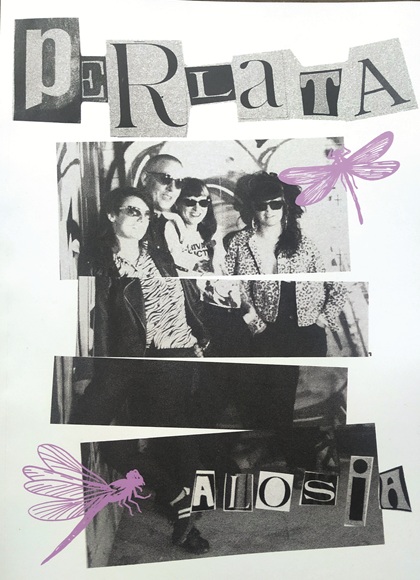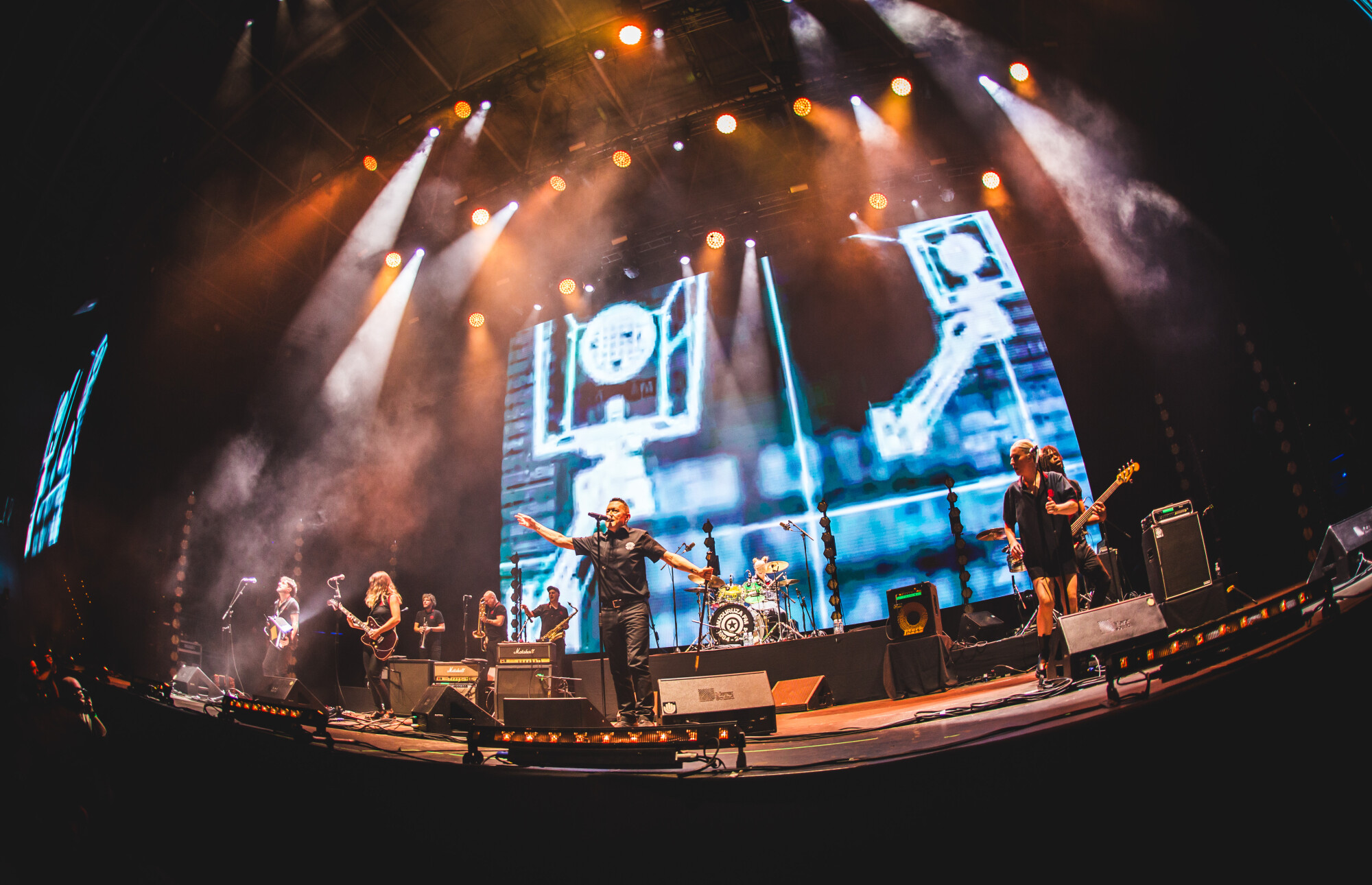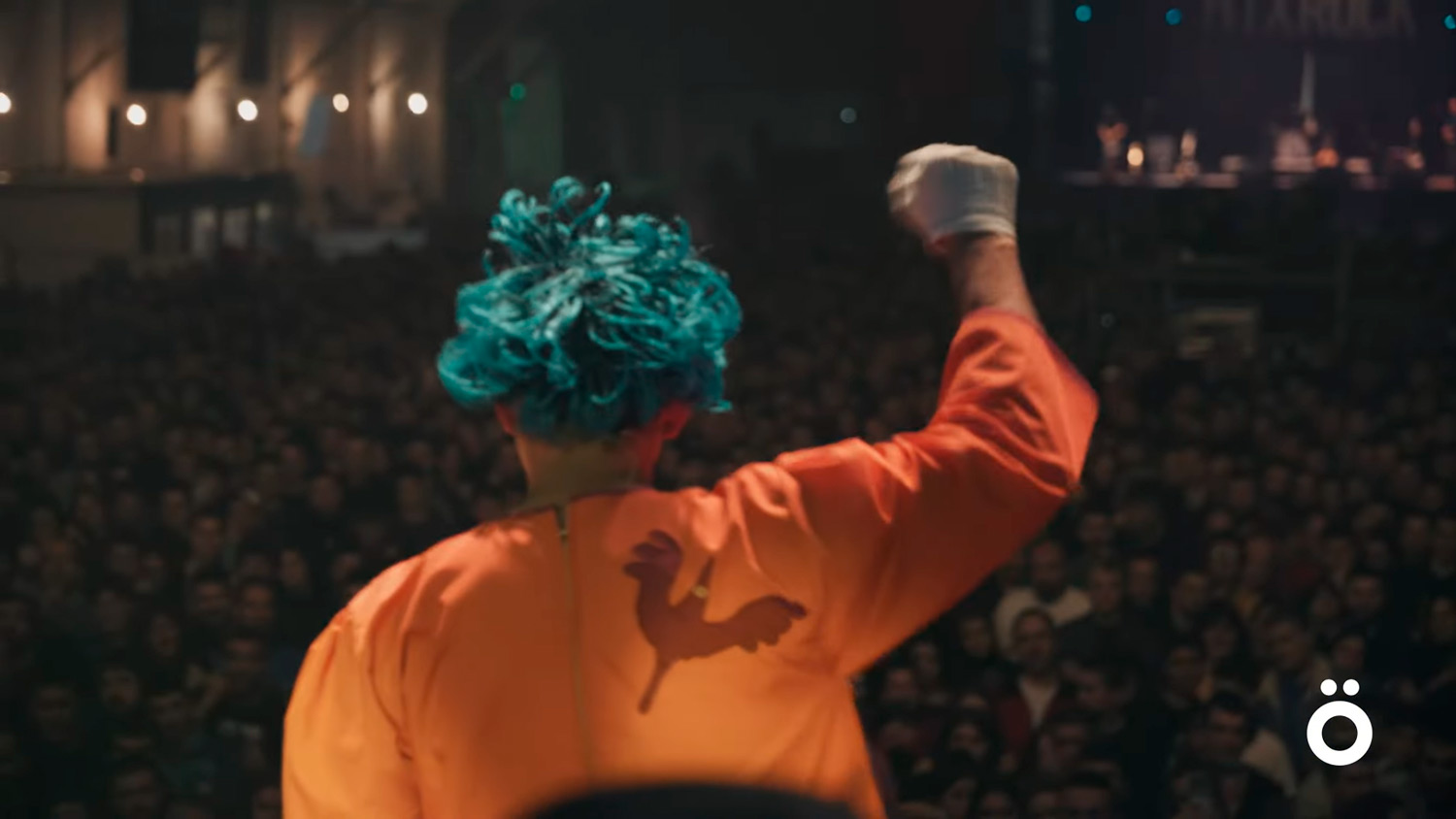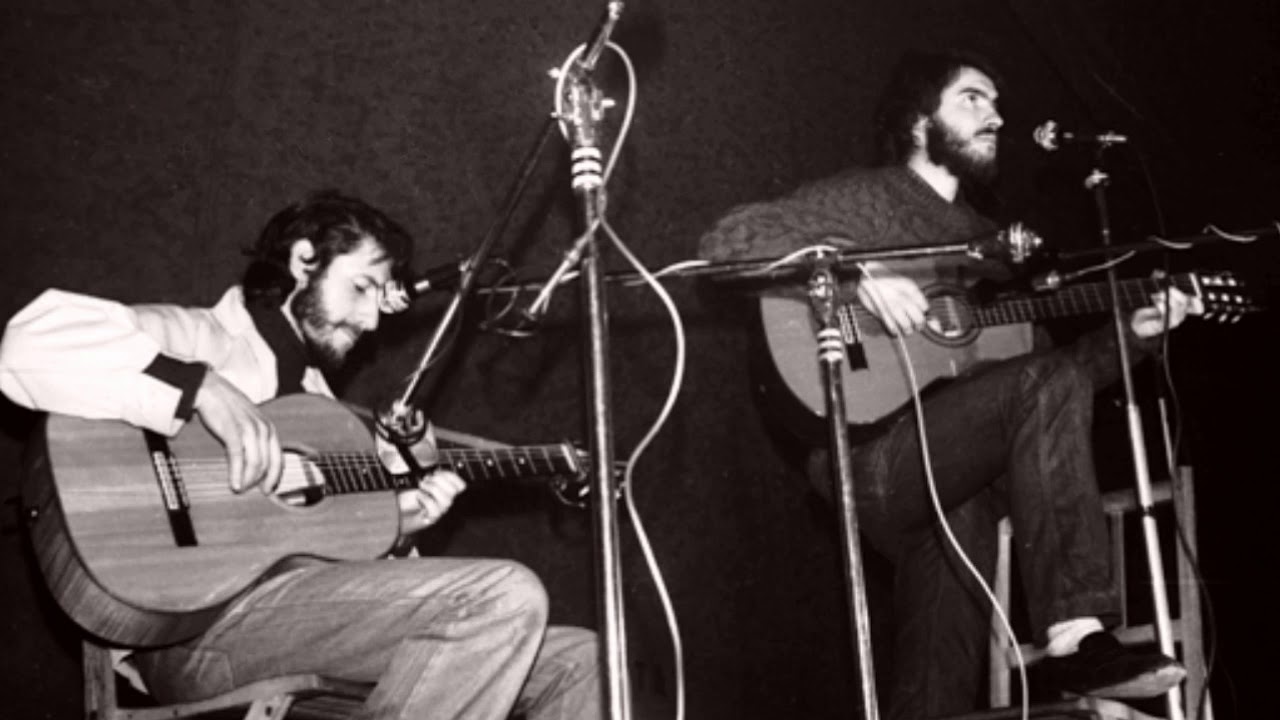New forms and formats in the musical scene of the time
- A change is taking place in the musical scene of Euskal Herria. Different emerging groups have brought fresh air, with new forms, forms and speeches with music adapted to the current context. J Martina and Merina Gris are examples of this. ARGIA has been with them on the eve of their joint tour. On the day this magazine leaves the press, Merina Gris learns that he has won the Musika Bulegoa prize.
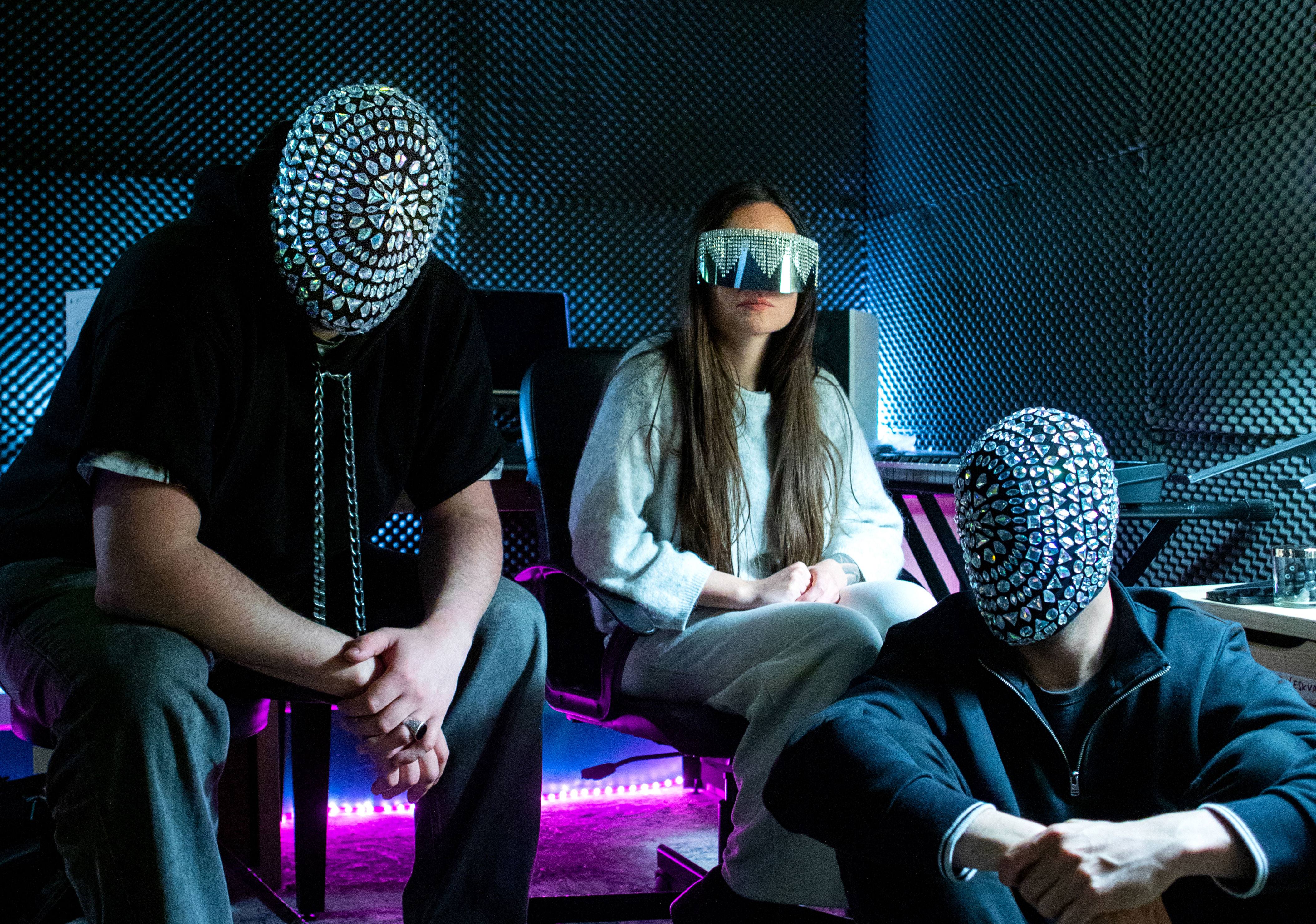
In 2017, Julen and Paskal started to sound the ideas that were at their head. Sara was asked for help finding the singer, and they got back something they didn't expect: that nobody would do better than him. Thus emerged the Merina Gris group. The three Donostiarras, beyond being similar referents, connected him to the way of making music and publishing it. In 2020, they released the first song of The Others. They hide their identity: they go up the tabside with their faces covered and they don't say their surname.
Group J Martina appeared on the networks at the same time. Salsear began in mid-2019 and in April 2020 the work of the Old World was published by the Larrabetzuarras sisters Ane and Kattalin Barcena and Barañano Javi Jorajuria.
Both groups are conducting parallel tours and have crossed. Together they have offered three tour concerts. They played in April in Vitoria and Pamplona and on 19 May in the Kafe Antzokia of Bilbao. J Martina has climbed the stage with band, J Martina 2.0, and has performed a tour concert with the Silitia group in San Sebastián.
Why you together?
Kattalin Barcena (J Martina): We share many aspects of space and music. For us it is enriching that as we make electronic music we have reference groups in the Basque Country. It's enriching to share spaces with these people, because we learn a lot from them and it's part of our project.
Julen (Merina Gris): We connect a lot with their way of feeling and making music.
Pascal (Merina Gris): Musical codes are similar to ours, and the audience is often similar.
Are they part of a new generation?
Javi Jorajuria (J Martina): Formally yes. The changes that have taken place are the result of many groups now forming, including ourselves, Merina Gris, Silitia and so many others.
C. Meal: Seeing that the tracks of the Basque Radical Rock are finished, a new way of making music formally emerges. But we don't just intend formally to make another music. Within the Basque Radical Rock there have been many referents of political music, and what interests us today is to find ways of making political music, adapted to the present times and the context of our generation.
Ane Barcena (J Martina): This doesn't mean that current punk doesn't respond to that. We are formally part of a new generation as a result of the changes that have taken place, taking advantage of technological advances to make electronic music. But in all musical genres there are changes and they can all adapt to the current context.
Sara (Merina Gris): There are a lot of uncomfortable people on the scene today. Before, the scene of rock and metal was very marked, and the scene of pop was very marked… Now there are many things in common. To see how we evolved from these sluts is nice, now everything is much more real.

Pascal: Pop walls, electronics, rock -- they've broken. Today's young people have been heard equally by Toc, Lukie, Mirua or Süne, and giving this first hearing a chance is a satisfaction.
Julen: Young people are making modern music without neglecting its aspects. For example, the Mirua group is doing things that have not been done in the Basque Country, but also includes traditional Basque music and do not ignore it. The same thing happens to us. When we were young, music was consumed in a very anarchic way. We have heard Piperrak, Skalariak, Xabier Lete, Blink 182 and Evanescence. And we don't try to merge all of this, we are all of that.
Sara: So what we're going to do is going to change a lot because now we also consume a lot of things. I think it is surprising that a group always has the same style.
They say the way we make music has changed. What do you mean?
J. Jorajuria: We talk about the music that is made with the resources that are there at the moment. It used to be done with a guitar or amplifier, which was what was available. Today we use them, but we have the possibility to use more tools and reach many other sounds and rhythms. This new form is not only taking and copying the reggaeton, but also trying to adapt those forms to this context. Giving its own way.
Sara (Merina Gris): "We want to make ourselves feel all but indifference."
Julen: It has an irrational point: take everything to the extreme. Both in sound and at work. We do things like we live from that, when that's not possible. It makes no sense, because we all have a paid job and a social life, but we were clear that we wanted to take our project to the extreme. We believe a lot in what we do.
Pascal: Not only has the way we make music changed, but the way we do it. We also attach importance to photos, videos... We do not say “there is no money, there is no time, therefore, it does not matter.” Let's turn around. Is it worth delaying and taking care of the scene?
C. Meal: Seeing how norms and people have changed culturally, what we want is to connect with people through music and get what we mean. To do this, it is very important to analyze what people’s sensibilities are, what we hear, what music and melodies move us… not so much to like the public, but to see how we can leverage the tools available to move something within people.
They care a lot about aesthetics. Songs are also disseminated separately, each with its own video clip.
A. Meal: For us aesthetics is very important in our music and we try to work aesthetics as we work the image. We're lucky because we have people around us who work in different artistic disciplines. In the image, in the costume, in the artistic direction that the Sahatsa –Jauregi– has made us in the last album…
Kattalin Barcena (J Martina): "Our goal is not to create a Basque market in Euskal Herria to make our products profitable."
Julen: We've ever thought about taking a song out without video clips, but every song we do has a lot of laps and we think we have to give it that place they deserve. That's what singles are about, that's the leading role that songs deserve.
J. Jorajuria: The different artistic forms are not separated from each other, they have always collaborated, in the case of music with architecture. Due to the limitations of our capabilities, we use the video format. On the last album, together with the Sahatsa, we collaborated with music and sculpture, and we had to publish it in video format, for example.
What do you want to achieve with music?
Sara: We want to make ourselves feel all but indifference. We seek to move within and to achieve it we put the soul, the body and everything everyone has.
J. Jorajuria: The same thing we want with our militancy, I would say. Music is one more instrument in our daily lives to reflect what we want to achieve with militancy and try to intervene in that cultural change.

C. Meal: We usually want to sing two things. On the one hand, we want our letter to reflect everyday life, singing from our most intimate experience to a general context, to show what we feel in these times and in this place. Being politically related does not mean that they are pamphlets; pamphlets are pamphlets and songs are songs. On the other hand, we are committed to organization, change, the future.
Sara: We want to explain things as they are, and if life is hard, we say so.
How do music and politics relate to the current landscape?
A. Meal: I believe there is a clear tendency to see music and politics as separate areas. There is no intention of reconciling music with the political context, or it is done from individualism, limiting itself to personal experiences. I do not mean that it only exists, but the trend is clear.
C. Meal: We live in a depoliticised era that is also reflected in music, as in all other areas. It is very interesting that in Euskal Herria very fresh groups are being created that enrich the musical panorama. We want to encourage this change from a formal aspect to a change in content. To do so, artists should be seen as political agents, subjects with influence.
Julen: Everything has a political reading. If you constantly reclaim the void, that is a political position.
J. Jorajuria: For example, in the confinement the fact that the Zetak group publishes the song Zein ederra izango da has a great political influence. They are statements of acceptance of what is there, even if naively. It is not enough to say “I separate music from politics, I only make music.” No. It makes political music, it's a matter of who you benefit from.
Sara: Social media has also changed the landscape, music is no longer pure music. They are an instrument to meet artists and you publicly position yourself with the language that is used on social networks in everyday life and with what it shares. On many occasions, music does not need precise words to show its thinking.
Javi Jorajuria (J Martina): "Although music is becoming universal, it doesn't mean it's happening outside the market."
Have you felt the need to move on social media?
Pascal: No, and I believe that a group cannot be required. I think it is right that the members of a group should be rooted and say in a political position, but not that it should be demanded.
Sara: We have common sense as a group. We believe that we have to protect some things and that others make no sense to us. But that's the limit.
Have you considered playing in some places as political work?
C. Meal: Yes, always. For us it is very important the shared moment that music can create with the public in one or another space, as well as the bet of musicians for spaces or concrete initiatives (gaztetxeak, political or social initiatives, parties...). That's where our music makes sense, when the audience feels that the song is not ours, but collective. But for us, it's also interesting to be in stranger spaces, because the goal is for our music to reach different people.
How do you see the overall music landscape in the money market? Should an artist live from music?
Pascal: I don't think an artist has to live from that just because he's an artist, but if someone wanted to, yeah.
Julen: We don't hesitate with a plumber. A plumber is not going to fix things for free at the home of others, what we call unfair competition in capitalism. It is true that we cannot apply this to 100% in disciplines. In other trades you have to be productive, being productive with art can be dangerous. You can lose a factor that sets it apart from other trades: truth, honesty. I believe that the goal should not be economic benefit, but the launch of your work.
Julen (Merina Gris): "Precariousness is behind the current multidisciplinary approach; the 'Do it yourself' can be very precarious"
Sara: It should be an opportunity for whoever wants and can. You don't have to idealize it, you see more and more that many of those who live in art are leaving their jobs. It seems that living from music is a great bargain, but behind there is a lot of sacrifice. Social life and leisure often have to be abandoned, and artists are very anxious.
C. Meal: It is often reported that many artists, such as those we sing in Euskera, do not meet the requirements for other products to function as they work in the market. But our goal is not to create a Basque market in Euskal Herria to make our products profitable. Our objective is to create a new type of society, both in Euskal Herria and elsewhere, which is not governed by the logic of the market and which, therefore, can freely perform artistic production.
One thing is to earn a money from music in the moment to make your artistic production better off, and another thing is that the goal is to live from music. Living from music, your artistic production will depend on market times, demand, hobbies... If the goal is to live from music, in part you have to accept these conditions. Our goal is not that.
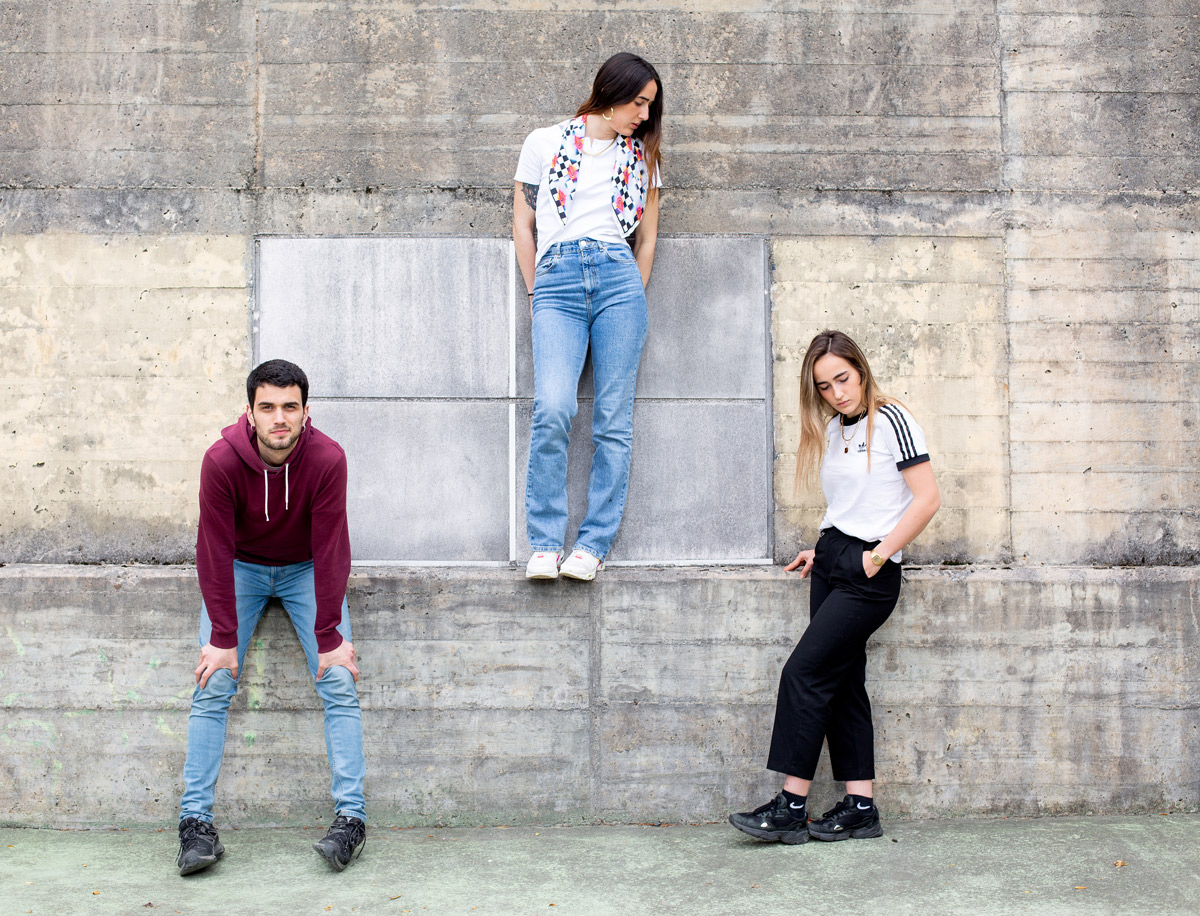
Nowadays the discs have lost strength, the music of the platforms predominates, in theory it is easier to disseminate it… Is it universalizing making music?
J. Jorajuria: There's more chance of making music, but you can't spread that much. And although music is becoming universal, it doesn't mean it's being done outside the market.
C. Meal: The first discographies were the ones that got benefits from the album. Now you don't pay 2,000 euros to this record and you can record it in your house. But you have to pay a reseller to upload to your music platforms, people also pay resellers to enter the playlist…
Julen: And then you go up to a platform that pays you 0.008 euros for every musical play. Multidisciplinary is behind precariousness. Do it yourself ("Do it you") can be very precarious, you have to do all the work you, you cannot hire a designer or a camcorder…
How does Spotify work?
J. Jorajuria: Spotify is not like Instagram, it's not just making an account and climbing songs. You have to make a contract with a dealer and everyone has their offer. We have no control over this, and what Spotify pays with calculations, what comes to us and what should come to us, is not real. It’s not transparent, you don’t know where the money has remained, who has charged, how much the platform has paid you…
Merina Gris leaves the tablated with mask. Why?
Julen: The artist is often given more importance than the product. I like to meet the artist, but we've touched other groups and we didn't want to give the opportunity to create biases. We began to hide faces as a game with artistic intentionality, but paradoxically it has reinforced our identity by hiding our identity.
What projects do you have from now on?
Julen: We are thinking of a second job and we have quite a few concerts in the coming months. We are eager to continue counting. In a song we tell you what I swear is the hostile I have to tell (I swear I have to tell), and that is what we feel. We do not mean that it is better than others, but we believe that what we do is worthwhile and we want to reach the largest number of people who connect us.
Pascal: We want to maintain consistency. I believe that we have reached this point and that the group is moving forward because we are very constant.
J. Jorajuria: For J Martin, this year's biggest head breaker has been the band. It is our intention to continue gradually and to take them out and offer them.
A. Meal: In summer we will keep the initial format, we will give the three concerts.
Itoiz, udako sesioak filma estreinatu dute zinema aretoetan. Juan Carlos Perez taldekidearen hitz eta doinuak biltzen ditu Larraitz Zuazo, Zuri Goikoetxea eta Ainhoa Andrakaren filmak. Haiekin mintzatu gara Metropoli Foralean.
Sawdust
Olaia Inziarte
Panda, 2024
-------------------------------------------
Fourteen songs written during the Depression. Olaia Inziarte presented it in the first late night in Basque that can’t be mentioned now. The bru-ta-la piece Sawdust opens the disc. A jazz... [+]
Nafarroa Arenan Mitoaroa ikusten izandako lagun batek “telurikotzat” jo zuen entzun-ikusi-sentitutakoa. Niri ere hala iruditu zitzaidan telebista medio etxetik hauteman nuena.
Pentsa daiteke Mitoaroak piztutako grinak eta atxikimenduak proiektuaren ikusgarritasuna... [+]
Since Benito Lertxundi, who told us that he will leave the scenes for ever, we have been there for several weeks, and since then many of us have felt orphans in one way or another, with a sense of loss or abandonment, sad. To Iruindarro, at least, we will remain forever honored... [+]
Basque Country Herriko Gazte Orkestra. Winter Meeting
Director: Iker Sánchez.
Narrator: Kepa Errasti.
Programme: Works by Britt and Beethoven.
Place: Victoria Eugenia Theatre, Donostia.
Day: 2 January.
-----------------------------------------------
After 27 years, we... [+]
Chulería, fuck!
WHEN: 5 January.
WHERE: At the Kafe Antzokia in Bilbao.
----------------------------------------------------
As I filled the room, looking down behind the railing above the theater, I've been playing to see if I find someone younger than me before the... [+]
Beyoncé at the break of an American football game in Houston, Texas. The American singer has come to the center of the stadium in a cowboy suit that she's had access to. The hat covers the nice, the legs the boots long to the knees. The scarce white suit shows her thighs and... [+]
The New Year’s Morning is the title of a roundness created by Joxe Ansorena, brother of our grandfather Isidro, for the Txistularis to hit the streets during the New Year’s Morning. In the air of that melody, we were picking up the wrecks of the night, like the garbage... [+]
Alosia
Perlata
Autoproduction, 2024
----------------------------------------------------
The Arrasate Perlata group has published a new work. He has several records behind him and his latest work is punk, Oi! And it was a documentary in tribute to the unrepeatable... [+]
FERMIN MUGURUZA 40. ANNIVERSARY
When: 21 December.
Where: Bilbao in the Arena.
-------------------------------------------
Every year Bilbao will be on the 21st of December. The cider and talo, protagonists of the day, is the day of the fair of St. Thomas. This year,... [+]









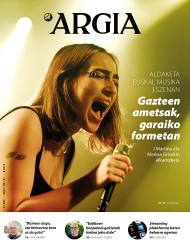

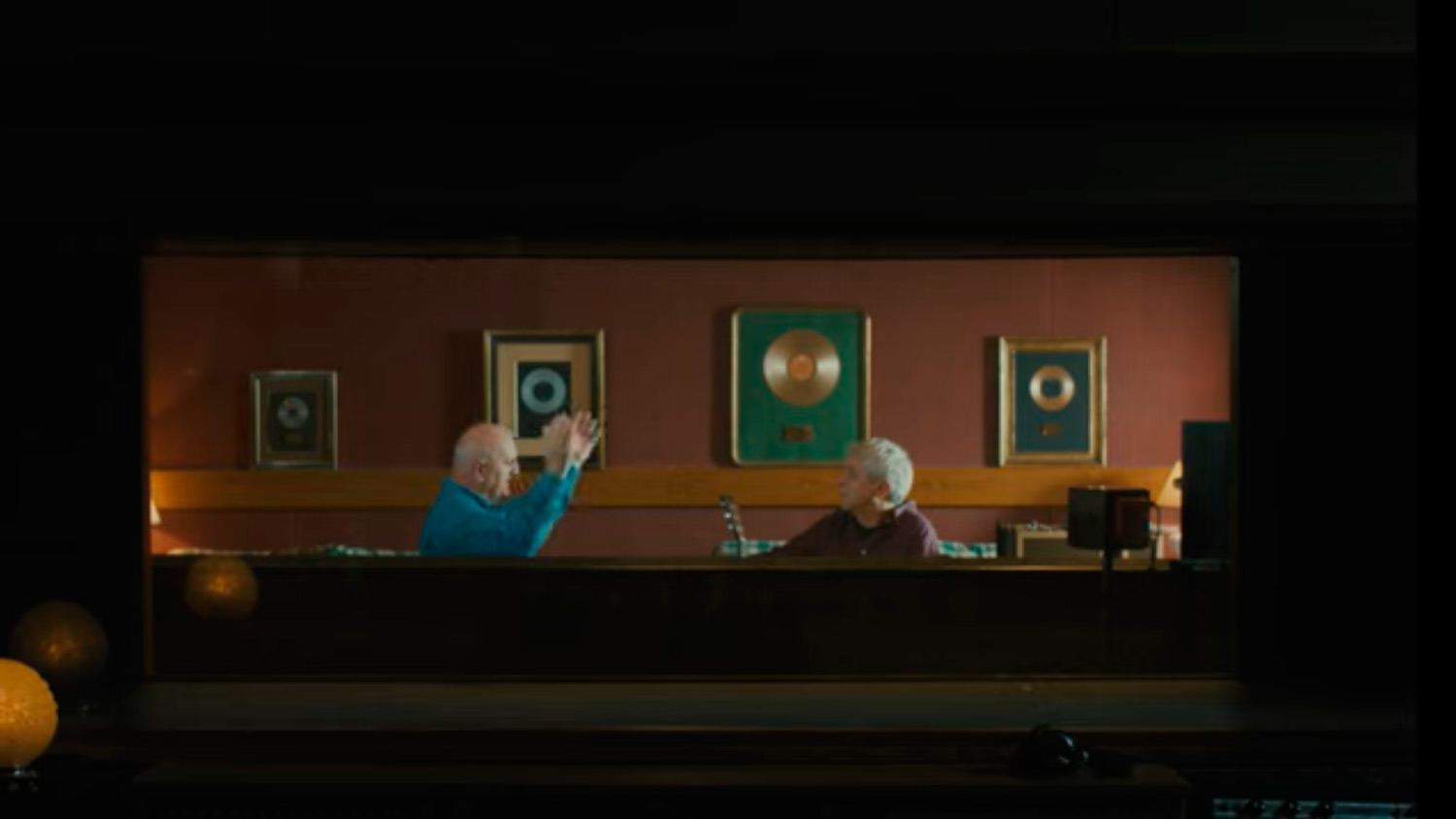



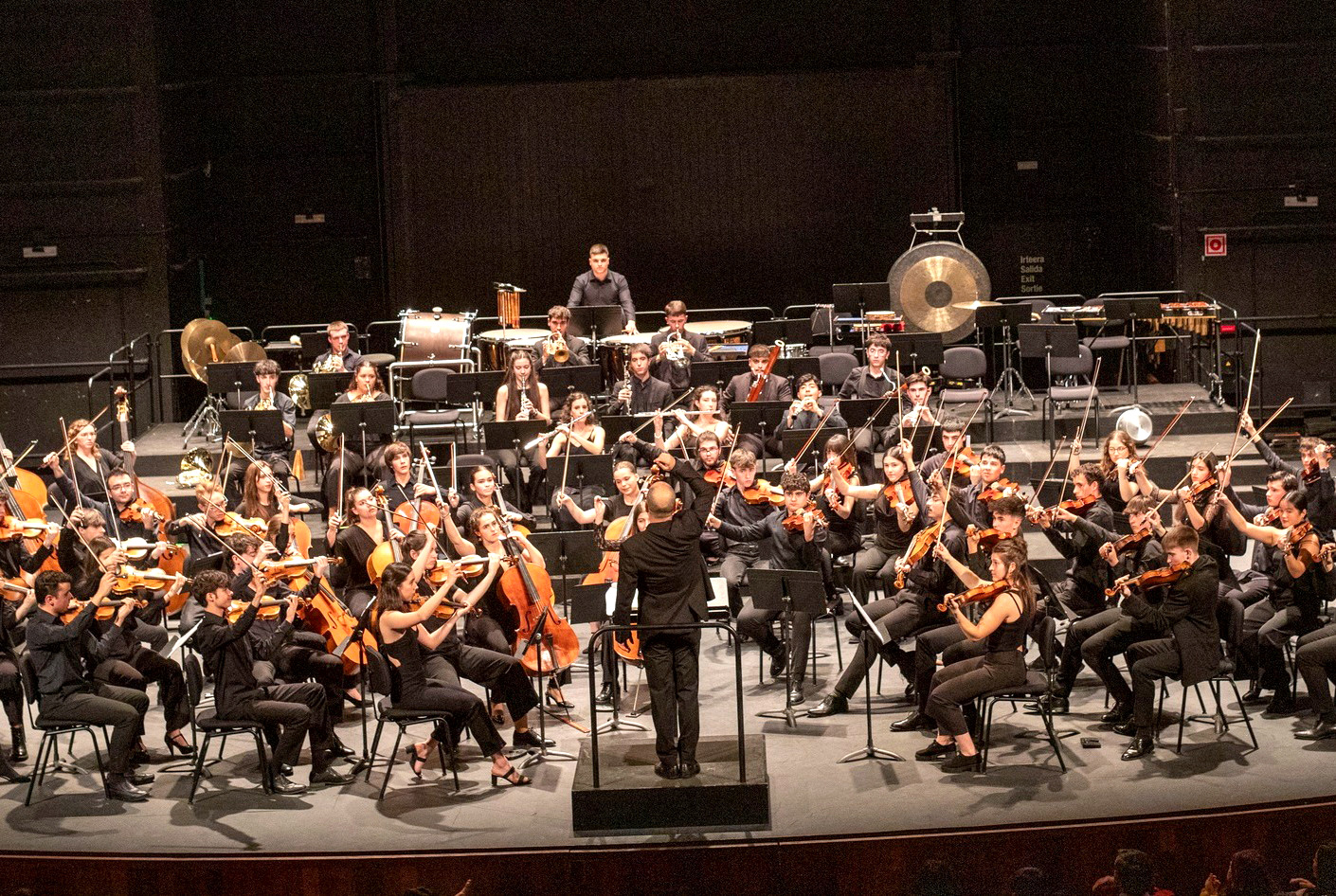
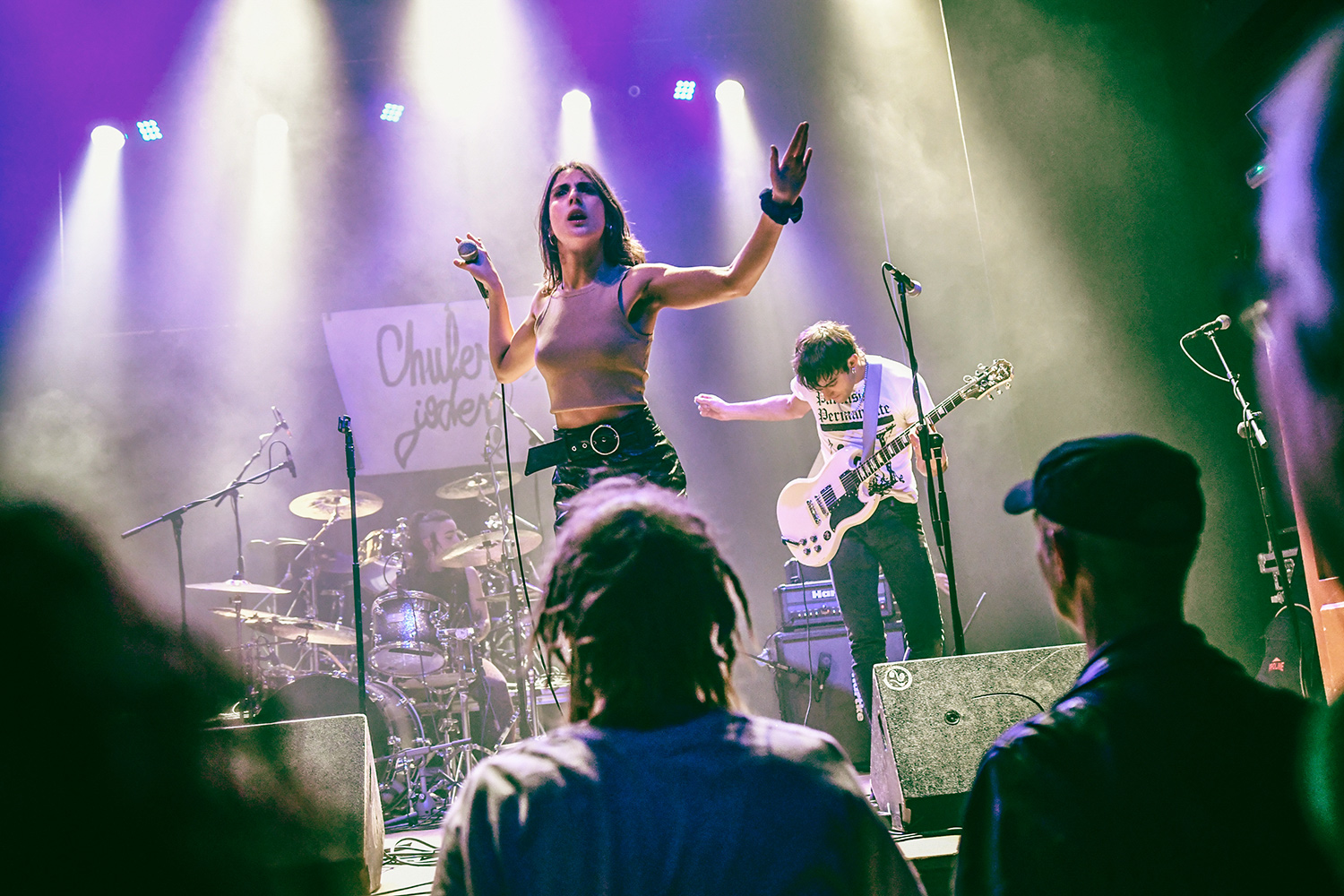


.jpg)
